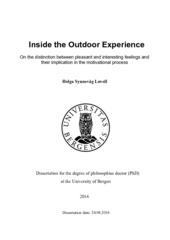| dc.description.abstract | Inspired by the functional well-being approach (Vittersø, 2013a, 2013b), this study set out to explore the distinction between hedonic and eudaimonic dimensions of feeling states to understand more about the variety and richness of experiences in the outdoors. Sixty-four first-year students of a combined sports- and outdoor bachelor education were followed over three semesters to identify the qualities of hiking experiences and the influence of these experiences on intrinsic motivation and choice between future sport education or outdoor education. Two hiking experiences were a compulsory part of the program: A three-day coastal hike, including camping and practical seamanship, and a three-day skiing hike in the mountains in the wintertime, including training on safety in potential snow avalanche areas. The event reconstruction method, as a version of the day reconstruction method, was applied to measure peak episodes, whole-day experiences, and remembered experiences. A replication of experience measurements was conducted in a second sample following a group of 26 outdoor students on a five-day introduction course to glacier hiking. In the identification of experiences that are empowering, important, or positive, Paper I set out to investigate the role of challenges and skills. The challenge–skill ratio (CSR) was tested on series of positive feeling states. The analysis results revealed that against mainstream theory, the CSR was a poor predictor model for subjective experiences in general. With regard to the relationship between challenges and skills, support for an imbalance theory was found: An imbalance toward higher skills produces more feelings of pleasure, while an imbalance toward higher challenges partly shows correlation with interest. The balance condition between high challenges and high skills did not appear to predict the best positive experiences in any of the 24 tests. The results indicate that research needs to be nuanced to different concepts of positive functioning. In an exploration of different valences of experiences, exemplified by pleasure and interest, and different time perspectives of the experiences, Paper II set out to investigate the relation between peak episodes, whole-day experiences, and remembered experiences. Peak episodes were coded into seven different groups of experiences. Sixty percent of the reported peak episodes related to “exercising basic outdoor skills” typically reported as more interesting than pleasant. The remaining 40% of the episodes all had in common that they were typically more pleasant than interesting. In the memorial process, factor analysis revealed that interest and pleasure had different dynamics over time and that interest approached the factor of pleasure but not vice versa. A path model explained that interest had a predictor role on pleasure over time, and this effect was stronger as time went by. Thus, interesting experiences feel more pleasant as time goes by. Furthermore, the findings replicate earlier studies on the importance of remembered experiences as the best predictor of prospective motivation. Paper III had an overall aim of analyzing the influence of emotion in the motivational process of choosing a major. The importance of positive emotions in motivation regulation is well known, but the knowledge of new experiences in the causal chain of self-determination is limited. Analysis revealed that positive emotions had a direct effect on intrinsic outdoor motivation. Analyzed in two separate regression models, the isolated effect from new positive emotions on intrinsic motivation could account for a 12% increase in intrinsic motivation when controlling for the effect from previous intrinsic motivation. Furthermore, while positive emotions from the second event correlated with outdoor choice, a logistic regression analysis revealed that only intrinsic outdoor motivation predicted outdoor choice. The indirect influence of situational emotion seemed to influence this process. The findings underscore the importance of new positive experiences in the motivational process and, moreover, how these emotions internalize into patterns of intrinsic motivation. The PhD thesis contributes to empiric knowledge and theory improvement in several areas of understanding “the good hiking experience” but also understanding and measuring positive emotion within the concept of well-being. The findings of how positive emotions induce, change over time, and build intrinsic motivation have practical implications for outdoor leaders or guides in making informed choices and paying attention to emotions during and after events. The findings are also important for public health in understanding the motivational dynamics of outdoor engagement. | en_US |
| dc.relation.haspart | Paper II: Løvoll, H. S., Vittersø, J., & Wold, B. (2016). Experiencing the outdoors: peak episodes are interesting but the memories are pleasant. Journal of Adventure Reprints were made with permission from Springer and Routledge. All rights reserved. Education and Outdoor Learning. 16(3), 269-284. Full text not available in BORA due to publisher restrictions. The article is available at: <a href="https://dx.doi.org/10.1080/14729679.2015.1122541" target="blank">https://dx.doi.org/10.1080/14729679.2015.1122541</a> | eng |
